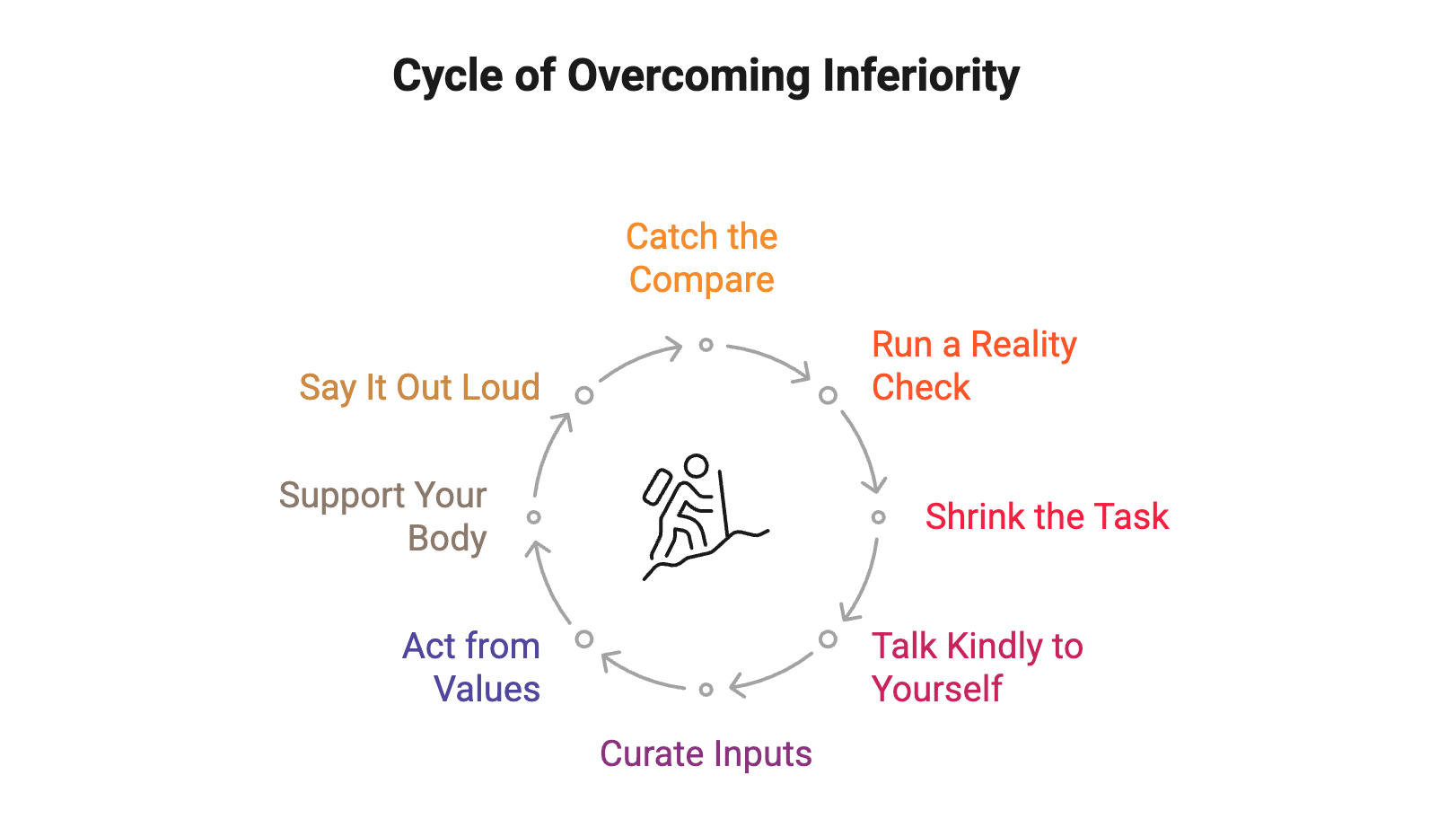Signs of a Sense of Inferiority Complex—and When to Get Help in DC
If you often feel “one‑down” no matter what you do, you’re not broken—you’re stuck in a loop that many people know well. A sense of inferiority can significantly impact mental health, making it important to address for overall well-being. This guide explains what an inferiority complex looks like, why it sticks, and what actually helps. You’ll also see what therapy can look like with a DC‑based clinician.
What do people mean by a “sense of inferiority” and an “inferiority complex”?
A sense of inferiority is the feeling of “I’m less than.” Feelings of inadequacy and feelings of inferiority are core emotional experiences that can persist over time, shaping how a person views themselves and interacts with the world. An inferiority complex is when that feeling becomes a pattern that colors many parts of life and is hard to shake. Someone with an inferiority complex may struggle with their own feelings of inadequacy, and these inferiority feelings can shape behavior and self-perception.
Early experiences of feeling small can harden into later stories about not measuring up, which then drive more comparing and self‑doubt. Childhood experiences and childhood trauma are often root causes of these patterns, and primary inferiority can originate in early life. Primary inferiority is rooted in childhood, often due to parental comparisons or negative early influences, while secondary inferiority can develop later as a result of ongoing challenges or failures. The term ‘inferiority complex’ was first described by psychologist Alfred Adler, who emphasized the role of early experiences in shaping these patterns.
Research backs this up—for example, a 2022 Scientific Reports study linked heavier comparison habits with worse day‑to‑day mood, and a 2022 Frontiers in Psychology paper described how fearing others’ judgments keeps anxiety going.
After repeated self-doubt and comparison, an inferiority complex may stem from psychological deficiency or erroneous belief about one’s worth. According to individual psychology, individual differences mean not everyone develops these patterns in the same way.
What are the most common signs in daily life?
- Constantly comparing and constant comparison. Work, school, appearance, status—scrolling can crank this up, as that Scientific Reports study found. People with an inferiority complex may constantly compare themselves to others, especially on social media, which can intensify feelings of inadequacy and negatively impact social interactions.
- Negative thoughts and negative feelings. Persistent negative thoughts and negative feelings about oneself are common, including anxiety, self-doubt, and low self-worth, which can affect overall well-being.
- Negative self-image, social withdrawal, and avoidance of social situations. A negative self-image often leads to social withdrawal and avoiding social situations due to feeling self-conscious or unworthy, further isolating individuals from meaningful connections.
- Harsh, absolute self‑talk. Words like always, never, and everyone is ahead of me are clues. Psychologists call these all‑or‑nothing thoughts.
- Avoidance and procrastination. Shrinking goals, passing up opportunities, or staying quiet to avoid failure. Fear of failure or low self-esteem can also cause people to avoid challenges such as applying for a job promotion.
- Overcompensation (a “superiority” mask) and being excessively competitive. Perfectionism, one‑upping, dominance, or being excessively competitive to cover a one‑down feeling—described in classic social‑personality research in the British Journal of Social Psychology. Coping mechanisms for individuals with an inferiority complex may also include perfectionism, aggression, and overachievement.
- One‑down relationships and impact on romantic relationships. Excess reassurance seeking, jealousy, or pulling away to feel safer. Feelings of inadequacy can negatively affect romantic relationships and relationship dynamics, leading to insecurity or difficulty forming healthy attachments.
- Unrealistic standards and impact on lives. Exposure to unrealistic standards of success, beauty, or happiness—especially through social media—can harm self-esteem, well-being, and the way people view their own lives.
- Impact on everyday life. An inferiority complex can affect everyday life, including work, relationships, and social interactions, making it difficult to fully engage or find satisfaction.
- Mental health risks and the importance of support. Inferiority complexes are linked to mental health issues such as depression, eating disorders, self-harm, and other mental illnesses. Seeking help from mental health professionals and support from loved ones is crucial for recovery and improving well-being.
Why do these patterns stick around?
- Fear of negative evaluation makes you forecast criticism and scan for it, which turns social life into a stressor. Negative thought patterns can reinforce this sense of inferiority, making it harder to break the cycle.
- Striving to avoid inferiority pushes perfection and approval‑seeking, which usually increases stress and shame, not relief. A self fulfilling prophecy can occur when negative expectations lead to behaviors that reinforce feelings of inadequacy.
- Old worth stories from earlier criticism or comparison can feel like facts. A basic feeling of inferiority can persist due to imagined physical or psychological shortcomings. These persistent feelings can negatively affect daily functioning and cause people to respond differently to challenges compared to those without an inferiority complex. Clinicians consider these themes alongside other mood and anxiety concerns in a full assessment; see the APA’s DSM‑5‑TR overview for context.
When should you consider getting help?
Reach out if these patterns are steady for weeks or months and start to interfere with work or school, relationships, sleep, or mood—or if you’re withdrawing or overworking to cope. If you’re in Washington, DC, a licensed therapist can help you shift from constant comparison to steadier self‑respect.
Talk therapy in a private practice setting can provide a supportive environment to address these issues, explore underlying causes, and foster mental and emotional well-being. If you’re having thoughts of harming yourself, contact emergency services or local crisis resources right away.
What actually helps with a sense of inferiority?
- Catch the compare. Label it when it shows up. Naming the habit gives you a beat to choose differently.
- Run a quick reality check. Ask, “What are three balanced facts about me right now?” Keep it concrete: effort, progress, feedback.
- Shrink the task. Pick a 10% challenge you can finish today. Small wins weaken the “I can’t” story and help build self confidence.
- Talk to yourself like a friend. Softer self‑talk lowers shame so change sticks. Using positive affirmations like “I am capable” or “I am worthy” can boost self esteem and reinforce a healthier mindset.
- Curate your inputs. Mute accounts that spike comparison and follow people who show process, not just outcomes.
- Act from values, not fears. Choose one action that fits who you want to be—apply anyway, practice anyway, show up anyway.
- Support your body. Sleep, movement, and daylight steady mood and make thinking more flexible. Addressing feeling inadequate by caring for your physical health can also improve your mental well-being.
- Say it out loud. Naming the one‑down feeling with someone safe breaks isolation and adds perspective. Learning to cope when you feel insecure is an important step to overcome an inferiority complex.
What would therapy look like at Therapy Group of DC?
Care is collaborative and practical. Early sessions map your loop—where comparison, harsh self‑talk, or overcompensation shows up—and set clear goals. Many clients benefit from a mix of:
- CBT skills to spot all‑or‑nothing beliefs and test them against real‑life data.
- Behavioral experiments that grow confidence through action, not just insight.
- Compassion‑focused strategies to reduce shame and steady self‑respect.
- Depth‑oriented (psychodynamic) therapy to explore early life experiences and update old “I’m less than” stories that still steer the present.
Therapy is tailored to each person, focusing on their unique experiences and aiming to improve their daily lives. Inferiority and superiority complexes are often two sides of the same coin; therapy can help address both by fostering self-understanding and emotional balance. A recent meta analysis shows that therapy is effective in improving self-esteem and reducing feelings of inferiority across diverse groups.
We’re in Dupont Circle and work with adults across DC. Sessions balance here‑and‑now tools with thoughtful work on the story underneath. Cost a concern? Ask about lower‑fee options through our training clinic.
Ready to take a step? You don’t have to eliminate self‑doubt to get started. A single conversation can help you move toward a steadier sense of worth.
Frequently Asked Questions About a Sense of Inferiority
What are common signs of an inferiority complex?
Common signs of an inferiority complex include chronic feelings of inadequacy, negative self-image, social withdrawal, overly sensitive reactions to criticism, and constant self-criticism. People may also exhibit avoidance of challenges or become excessively competitive as a way to overcompensate.
How does social media data relate to feelings of inferiority?
Social media data shows that frequent comparison with others online can intensify feelings of inferiority. Exposure to curated life milestones and unrealistic standards on social platforms often fosters a strong sense of inadequacy and negative feelings about oneself.
Can an inferiority complex affect my ability to form healthy relationships?
Yes, inferiority feelings based on low self-esteem can negatively impact romantic relationships and social interactions. People struggling with an inferiority complex may find it difficult to build healthy relationships due to feelings of unworthiness or fear of judgment.
What is the flip side of an inferiority complex?
The flip side of an inferiority complex is a superiority complex, where an exaggerated opinion of one’s own abilities masks underlying feelings of inferiority. Both are closely linked and represent different ways people cope with similar insecurities.
How can personal experiences influence chronic feelings of inferiority?
Personal experiences, especially during childhood, such as trauma or negative events, can contribute to the development of chronic feelings of inferiority. These experiences shape self-worth and can lead to persistent patterns of self-doubt and low self-esteem.
Where can I learn more about inferiority complexes in simply psychology?
Simply Psychology offers accessible explanations and resources about inferiority complexes, including their symptoms, causes, and treatment options, making it a helpful source for further understanding this condition.


